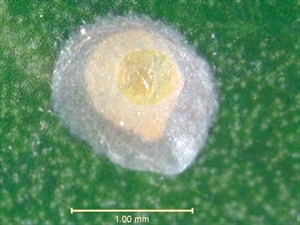- Worldwide distribution. Main hosts are coconuts and banana, but also avocado, breadfruit, cassava, guava, oil palm, sugarcane. An important pest.
- It is an armoured scale with a hard covering over its body. Eggs are laid under the scale; "crawlers" (nymphs) hatch, disperse (walk, wind, animals), but soon settle to feed and form the armour. Males are tiny, mosquito-like, mate and die. Females produce offspring even without mating.
- If numerous, fronds yellow, dry, fall and palms die.
- Natural enemies: ladybird beetles, parasitoid wasps.
- Cultural control: none recommended.
- Chemical control: soap, white or horticultural oils; do not use synthetic insecticides as they will destroy predators and parasitoids, and delay natural control.






